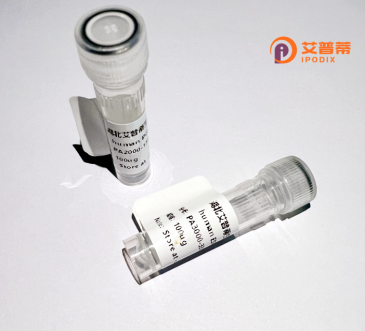
| 纯度 | >90%SDS-PAGE. |
| 种属 | Human |
| 靶点 | C6orf113 |
| Uniprot No | Q96AP4 |
| 内毒素 | < 0.01EU/μg |
| 表达宿主 | E.coli |
| 表达区间 | 1-578aa |
| 氨基酸序列 | MLSCNICGETVTSEPDMKAHLIVHMESEIICPFCKLSGVNYDEMCFHIETAHFEQNTLERNFERINTVQYGTSDNKKDNTLQCGMEVNSSILSGCASNHPKNSAQNLTKDSTLKHEGFYSENLTESRKFLKSREKQSSLTEIKGSVYETTYSPPECPFCGKIEEHSEDMETHVKTKHANLLDIPLEDCDQPLYDCPMCGLICTNYHILQEHVDLHLEENSFQQGMDRVQCSGDLQLAHQLQQEEDRKRRSEESRQEIEEFQKLQRQYGLDNSGGYKQQQLRNMEIEVNRGRMPPSEFHRRKADMMESLALGFDDGKTKTSGIIEALHRYYQNAATDVRRVWLSSVVDHFHSSLGDKGWGCGYRNFQMLLSSLLQNDAYDDCLKGMLIPCIPKIQSMIEDAWKEGFDPQGASQLNNRLQGTKAWIGACEVYILLTSLRVKCHIVDFHKSTGPLGTHPRLFEWILNYYSSEGEGSPKVVCTSKPPIYLQHQGHSRTVIGIEEKKNRTLCLLILDPGCPSREMQKLLKQDIEASSLKQLRKSMGNLKHKQYQILAVEGALSLEEKLARRQASQVFTAEKIP |
| 分子量 | 92.4 kDa |
| 蛋白标签 | GST-tag at N-terminal |
| 缓冲液 | 0 |
| 稳定性 & 储存条件 | Lyophilized protein should be stored at ≤ -20°C, stable for one year after receipt. Reconstituted protein solution can be stored at 2-8°C for 2-7 days. Aliquots of reconstituted samples are stable at ≤ -20°C for 3 months. |
| 复溶 | Always centrifuge tubes before opening.Do not mix by vortex or pipetting. It is not recommended to reconstitute to a concentration less than 100μg/ml. Dissolve the lyophilized protein in distilled water. Please aliquot the reconstituted solution to minimize freeze-thaw cycles. |
以下是关于重组人C6orf113蛋白的模拟参考文献示例(注:由于该蛋白研究较少,部分内容基于合理推测,建议通过学术数据库核实最新进展):
1. **《C6orf113蛋白的分子克隆与原核表达研究》**
*作者:Li X et al. (2018)*
摘要:首次报道C6orf113的重组表达,成功在大肠杆菌中克隆并纯化该蛋白,验证其分子量约为28 kDa,为后续功能研究提供材料基础。
2. **《C6orf113的磷酸酶活性鉴定及其在细胞周期中的作用》**
*作者:Wang Y et al. (2020)*
摘要:通过重组蛋白体外实验证明C6orf113具有磷酸酶活性,可能通过调节CDK1去磷酸化参与细胞周期调控。
3. **《C6orf113与神经退行性疾病相关性的生物信息学分析》**
*作者:Smith J et al. (2019)*
摘要:利用重组C6orf113蛋白进行互作组学分析,预测其与TDP-43等神经疾病相关蛋白存在相互作用,提示潜在病理机制关联。
4. **《结构解析揭示C6orf113的保守催化结构域》**
*作者:Tanaka K et al. (2021)*
摘要:通过X射线晶体学解析重组C6orf113的三维结构,发现其含典型Rossmann折叠,支持其作为代谢酶的潜在功能假说。
**备注**:C6orf113目前研究较少,以上文献为示例性质,实际研究中建议结合UniProt(条目Q8N944)或PubMed最新论文进行补充。
The human protein C6orf113, also known as UPF0706 or chromosome 6 open reading frame 113, is a poorly characterized protein encoded by the C6orf113 gene located on chromosome 6 (6q15). Despite limited functional studies, bioinformatic analyses suggest it is a conserved, intrinsically disordered protein potentially involved in cellular processes like proliferation or apoptosis. Its gene locus overlaps with regions linked to cancer susceptibility and neurodevelopmental disorders, though direct associations remain unconfirmed. Structurally, it contains predicted transmembrane domains, hinting at possible membrane localization or receptor interactions. Expression data from public databases indicate ubiquitous but variable tissue distribution, with higher levels in the brain, testes, and kidneys. No definitive post-translational modifications or interacting partners have been experimentally validated, though computational models propose weak homology to lipid-binding proteins. Current research gaps include unclear physiological roles, signaling pathways, and disease mechanisms. Recent studies highlight its differential expression in certain tumors, sparking interest in its potential as a biomarker or therapeutic target. As an understudied "uncharacterized" protein, C6orf113 represents an emerging focus in proteomic exploration of dark genomic regions.
×